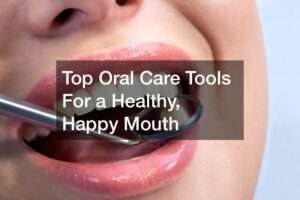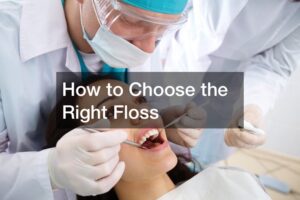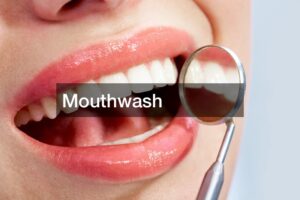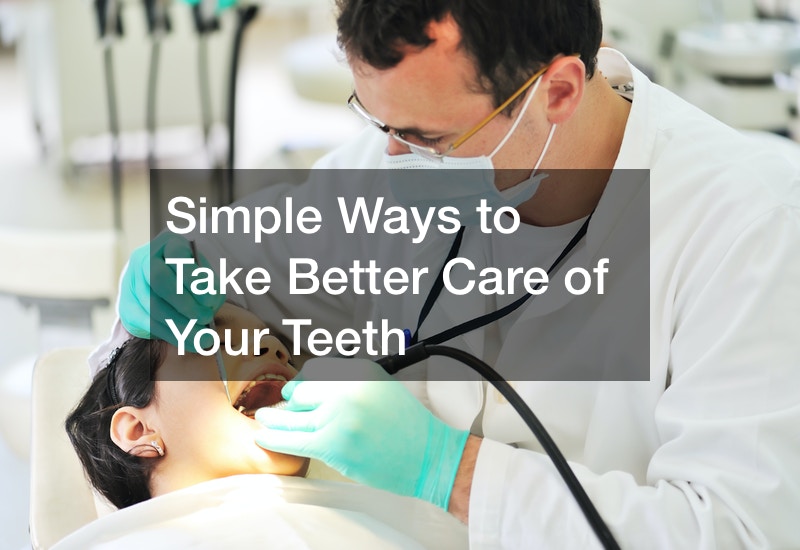
A smile is an important feature of your face. A simple smile creates a lasting first impression. For many, a bright, shining smile is a source of confidence. However, a beautiful smile requires its share of work. Teeth require attention and daily care to help keep them strong and healthy.
Good oral hygiene routines are the key to having a healthy smile for life. Contrary to popular beliefs, a healthy smile isn’t costly, and expensive procedures and treatments are not required to maintain your oral health. However, some people might require orthodontic or restorative treatment to fix their jaw or teeth problems.
Consistency is an important aspect of dental care. A quality cleaning regimen is effective if performed consistently and with the right tools. Here are the top 13 simple ways to keep your teeth happy and healthy from the comfort of your home.

Top Oral Care Tools For a Healthy, Happy Mouth
Caring for your teeth is a lifetime duty. You can make that job easier and successful by using the right tools. If you’re unsure of what to use, consult your dentist to help you make good teeth cleaning choices to keep your mouth healthy and smile bright. Here are the top five oral care tools you might want to consider:
Floss and Toothbrush
Flossing and brushing make your mouth clean. However, there are other important reasons for using these tools. They prevent plaque from building up, remove tiny food particles from your teeth, and lower your risk of:
- Tooth loss
- Weakened enamel
- Periodontal disease
- Developing cavities
How to Choose the Right Toothbrush
With so many styles, shapes, and sizes, choosing the right toothbrush can be confusing. Most dentists suggest checking out these factors when choosing:
- Type of bristle: Soft-bristled brushes are the best for removing debris and plaque without damaging your enamel.
- Toothbrush head: consider the toothbrush’s head when choosing your tool of choice. Ensure it fits well in your mouth by allowing the bristles to reach your backmost molars.
- Electric toothbrush: An electric toothbrush is the best choice for many patients. It cleans teeth well, particularly for younger patients and those with limited manual dexterity.

How to Choose the Right Floss
It’s best to consult your dentist if you aren’t sure about the type of floss to use. However, here are some helpful points you might consider:
- Do you have large gaps in your dental formulae? Try super floss or dental tape.
- Do you have small gaps in your dental formulae? Try waxed floss slides.
- Want less mess? Try disposable flossers.
- Bridges or braces? Try a spongy floss.
Tongue Scrapers
A tongue scraper is an essential dental tool recommended by most dentists because it helps remove fungi, debris, bacteria, dead cells, and toxins from the surface of your tongue. Its other benefits are:
- Eliminates awful breath by removing bacteria.
- Boosts your immunity system.
- Lowers your risk of tooth decay, gum disease, and gum recession.
- It opens up the pores on your tongue hence allowing you to enjoy the flavor of any food.
- Promotes saliva production, which helps in the digestion process.
Oral Irrigator
An oral irrigator is a pulse water jet tool used to remove debris and plaque that cannot be removed by flossing or brushing alone. Dental hygienists recommend an oral irrigator to patients with orthodontic devices or periodontal diseases. However, it has many benefits for everyone, including:
- Lower risk of gum diseases
- Improved gum health
- Fresher breath
- An easier and most effective way of cleaning between your teeth than flossing

Mouthwash
Its primary function is to freshen the mouth. It doesn’t replace a regular oral hygiene routine of flossing and brushing. Here are some factors to keep in mind when choosing the right mouthwash:
- Timing is essential: One of the important ways of using mouthwash correctly is switching it in the mouth for the correct amount of time. Typically, it’s recommended that you use it for a minute before spitting it out.
- Mouthwash is NOT a replacement: Besides your oral dentist recommending a mouthwash, you’re needed to follow your oral care routine to maintain healthy teeth.
- Dilute if necessary: some mouthwashes might recommend you dilute them; others don’t. Ensure you follow the guideline on the label to get the full benefits of the product.
Water
Water is fantastic for your oral health in many ways. For instance, water helps clean teeth of food particles that might cause tooth cavities or decay. However, are you aware that saliva is essential for keeping your enamel strong? Saliva is the body’s natural way to remove food particles and keep your mouth at an optimum Ph level. Therefore, ensure you drink plenty of water to keep your teeth clean and debris-free.
Remember: Brushing, flossing, and using a mouthwash or an oral irrigator are great ways of protecting your oral health. But, it’s still important to plan a visit to your dentist besides your current routine.
13 at Home Oral Care Tips
Here are important oral care tips to keep in mind.
1. Visit Your Dentist at Least Once Every 6 Months
Visiting your dentist for regular cleanings and examinations is one of the most effective ways of keeping your teeth healthy. Professional cleanings remove tartar, which can’t be removed by flossing or brushing alone. Regular examinations enable dentists to identify a problem in its earliest stage.
If you observe any bleeding gums or notice unusual symptoms or signs in and around your mouth, visit your dentist immediately! If you have a deep cavity or cracked tooth, contact your dentist for a root canal treatment. There are numerous health care agencies with dentists ready to serve you!
Remember that your teeth health services should be sought once every six months. Your journey for healthy teeth shouldn’t have to be one you accomplish on your own!
2. Avoid Over-the-Counter Dental Cosmetics
Over-the-counter dental cosmetics are misused when ordered without a prescription. For example, overuse of tooth whitening products causes sensitivity to too cold and hot drinks and foods hence damaging your tooth enamel. Too many over-the-counter dental cosmetics like whitening strips, pastes, polishes, gels eat away the protective coating on your tooth.
This is disastrous once it happens because your enamel can’t replenish itself. Also, one-size-fits-all bleaching trays aren’t a perfect fit since we don’t have the same mouth size. You should follow your orthodontist‘s directives for better use of Invisalign aligners and some tooth whitening products.
3. Drink More Pure Water
Keeping your mouth moist is important. Use your water filtration system to have yourself pure water for drinking. Mouth dryness causes plaque accumulation and your risk for both periodontal disease and tooth decay. Mouth dryness can be caused by alcohol, smoking, caffeine, and some over-the-counter dental prescriptions.
Drinking more water keeps your body hydrated, bringing several health benefits to your body. Water moistens your sensitive tissues and promotes the beneficial role of saliva. Saliva doesn’t only buffer acid but helps in the digestion process. Therefore, it helps the mouth fight bacteria and germs and protects the teeth from decay.
4. Snack Wisely
Some foods are better for your tooth than others. Sweet, sticky candies get stuck to your teeth and linger longer, causing decay. At the same time, vegetables and fruits are “cleaner” snacks for your teeth. The action of chewing carrots and apples helps keep your teeth clean. Limit your intake of sugary drinks and beverages and instead drink more water to help wash away germs that cause tooth decay.
5. Brush Properly
Brushing your teeth is the fundamental way of keeping your teeth healthy. Brush your teeth at least twice a day for 30 seconds. Be sure to brush all the surfaces of your teeth. Ensure you use the right toothbrush! Use a toothbrush with soft bristles and one that fits into your mouth.
6. Only Bite Food
Don’t be tempted to use your strength bite to aid your efforts when you are struggling with a stubborn package, trying to open pistachio, or struggling with a stuck bottle top. Resist! Biting things like plastic packaging or ice weakens and damages your teeth. It’s better to get a nutcracker, a pair of scissors, or some appropriate tools that were made for that job. Be kind to your teeth by letting them do their work- biting food.

7. Clean Your Tongue
Don’t forget your tongue as bacteria don’t only accumulate in your teeth. Debris can build up on your tongue, causing discoloration of your tongue and bad breath. There are two main ways of cleaning your tongue: scrapping and brushing. Whenever you clean your tongue, start at the back of your tongue and gently move forward towards the tip. Be sure to clean the entire surface of the tongue and then rinse your mouth after.
8. Floss Daily
Flossing helps to prevent tooth decay and maintains the health of your gums. Proper flossing is important as it makes a difference. Ensure that the floss hugs your tongue and gently slides it beneath the gum line. Also, don’t forget to floss the backside of your last tooth in every corner of your mouth. It would help if you flossed twice a day- before going to sleep and before brushing.
9. Use a Mouthwash
Like flossing, many Americans aren’t keen on using mouthwash. Not many of us understand how mouthwash works. Mouthwash does more than just give you a fresh breath. It lowers your mouth’s acidic level, hence minimizing teeth damages caused by acids. It adds more minerals to your teeth. So, when you swish it in your mouth, it cleans up your tongue, oral cavity, and teeth thoroughly.
10. Be Aware of Teeth Grinding
Teeth grinding is caused by anger, stress, concentrating, or a feeling of anxiety. Many people grind their teeth while sleeping and don’t realize that. If you have a worn tooth enamel, torn cheek tissue, or increased tooth insensitivity, you might be grinding your teeth while sleeping.
Your dentist can’t stop you from grinding your teeth, but they can instruct you to purchase a special mouth guard to wear at night. It prevents you from wearing your teeth down. A mouth guard (bite splint) only helps with symptoms and doesn’t stop you from grinding altogether.
11. Stop Your Bad Habit
Your oral health is dramatically affected by how you clean your teeth. However, some habits you might forget to kick off impact your oral health. Some of these habits include excessive alcohol consumption and tobacco products. Smokers often appear to have yellow teeth and a discolored tongue.
In comparison, excessive alcohol consumption slows the healing of a dental procedure and causes bad breath. Don’t be afraid to contact a medical professional to help you kick off these habits. Not only will it help your oral health, but also your entire health.
12. Fluoride Toothpaste
Ensure your toothpaste contains sodium fluoride. Scientific researches show that fluoride doesn’t only prevent cavities but also repairs tooth enamel.
13. Spit, Don’t Rinse
Most people gurgle and rinse straight after brushing their teeth. It’s a bad habit! Rinsing your mouth after brushing helps wash off the fluoride from paste hence protecting your tooth during the day. Therefore, spit rather than rinsing after brushing.
Teeth are valuable, just like any bone or body organ in your body. We hope the above tips will help you improve your oral health. Taking care of your oral health is important, but it isn’t a substitute for a regular dental visit. Talk to your dentist for more tips to keep your teeth healthy for a strong, bright, and beautiful smile!
